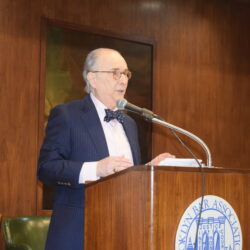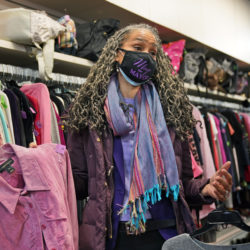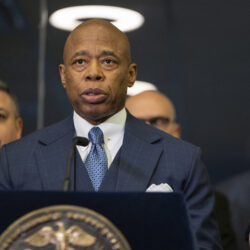
On This Day in History, January 27: A Comedic ‘Senator’ From Brooklyn
Edward Ford was born in Brooklyn in 1887. He could best be described as a “stand-up comedian.” In his time the term was “jokester,” and Ford was one of the best. The NBC radio network listed him as a “commentator” in their Artists Service Directory. Because his jokes were hilarious he was in great demand as an after-dinner speaker at banquets and conventions, and on the vaudeville stage as a monologist.
In the 1910s the Republican Club tagged the title “Senator” to his name and that became his show biz title. His popular speeches at the New York Lamb’s Club resulted in his creating joke-swapping sessions there. These sessions were so well-liked that “Senator” Ford thought that a jokefest might make a good radio show. He became the driving force, producer, and owner of a radio series named “Can You Top This?” which premiered on Dec. 9, 1940, over WOR-Mutual. NBC picked it up in 1942, Mutual again in 1948, ABC in 1950 and back to NBC in 1953, being broadcast until July 9, 1954.
The premise of “Can You Top This?” was simple. The listening audience sent in jokes, which were read to a panel of well-known punsters, each of whom in his turn tried to top it. That’s all there was to it, except that the man who read the jokes, Peter Donald, and the trio on the panel were all showmen. At least two of them, Donald and Harry Hirshfield, were considered masters of dialect, and all three members of the panel were veterans of vaudeville.
The panel became known as the Knights of the Clown Table. They used no notes or scripts on the air, relying on their vast combined knowledge of punchline humor. It was estimated that among them, they knew 15,000 gags, many of which could be modified to fit multiple situations.
The rules required jokes by the panel to follow the same general topic of the joke sent in by the listener. But Ford, Hirshfild and Laurie were masters at switching elements. A Scotsman became an Irishman, a Chinese man was a cowboy: the same joke worked with different window dressing, the only limitation being the quickness of the teller in a live format.
Ford was the toughest of the three to make laugh, described by Tune In magazine as “dour and sullen off-stage as well as on.” Hershfield was a famous cartoonist and after-dinner speaker who gave an estimated 200 talks a year. Laurie had worked as stickman in a gambling hall, as an exercise rider for a racing stable, and at “about 80 jobs” before gravitating into vaudeville and ultimately Ford’s radio show. Peter Donald was a radio man of long experience.
The opening signature seldom varied. Announcer Charles Stark introduced the panel: “Senator Ford … Good evening. Harry Hershfield … Howdy. Joe Laurie Jr … Hel-lo.” Then he introduced Wilson, who explained the jokes.
Any listener could send in a joke. If the joke was selected for the air, the listener got $5 (later increased to $10). If none of the wits topped the joke, the listener got $2 for each miss. A Colgate “laugh meter” was set up on-stage in view of the studio audience. The meter was in the shape of a laughing face, with a gauge in its mouth that registered the decibel level, from 0 to 1,000, for the audience microphone. A reading of 600 on a contestant joke was considered good, but toppers were often in the 800s, and many hit the 1,000-mark. All contestants received recordings of Peter Donald telling their jokes on the air.
Few jokes were original. Ford once said that in all his years on the show, there had never been a joke submitted that he hadn’t heard before. In the beginning, taboos were religion, politics and arson. Nationalities were considered fair game, and Donald could “do” the gamut, Jewish to Irish to Italian. The show could expect protests from a group thus lampooned, though Time magazine noted that “Scotsmen never protest.” Ford’s jokes often featured recurring characters — Ditsy Baumwortle, Elmer Smudgegunk, Mr. Snapgirdle, Mrs. Fafoofnick, Dopey Dillock, or Ockie Bopp.
Joke-screener Betty North scanned as many as 3,000 submissions a week. To the list of taboos North added a few of her own. She would not send over anything on death, race, deformities, or stuttering. She looked for “fast jokes, talking stories that don’t require anything visual to put them across.” The age of a joke was no factor. An audience would laugh as freely at something from antiquity as from that morning’s newspaper.
Edward (Senator) Ford was famous for his wit, drolleries and pronouncement of plain Yankee common sense, all reinforced with a dour demeanor.
He died on Jan. 27, 1970, in Greenport, N.Y.
This article was written by Vernon Parker (1923-2004)
Leave a Comment
Leave a Comment


